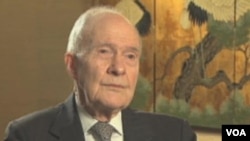Egypt’s military-backed government is going ahead with plans for a political transition following the ouster of President Mohamed Morsi.
In a VOA interview, former U.S. National Security Adviser Brent Scowcroft said the United States must help develop a strategy to restore Egypt’s economic and political stability.
"What is needed now is to put together a structure which can complete the building of an Egyptian political system — that is with a constitution, with elections, with governments that broadly reflect the interests of the electorate,” he said. “We are at the very early part of that, and managing it in a way which is beneficial and not harmful is a serious challenge."
Was it a coup?
On July 3, the Egyptian military deposed the democratically elected President Morsi, a senior member of the Muslim Brotherhood. He was ousted after a year in power and after millions of Egyptians took to the streets for four days protesting the way he ran the country.
Scowcroft, a retired U.S. Air Force lieutenant general, addressed the hotly contested issue whether the military action was a coup or not.
"This was not a coup in the normal sense of the word. Egypt is going through a very complicated period right now, and one of the rocks, if you will, of Egyptian society is the military," he said. "Egypt is blessed with a military that doesn't want to run the country. They want the country to run right, but they don’t want to run the country. And so I think that changes the whole character of what happened."
Some experts said defining whether the military action in Egypt was a coup or not is important because a U.S. law stipulates the cut-off of aid "to any country whose duly elected head of government is deposed by a military coup." But the Obama administration has been hesitant to apply that label to what happened in Egypt.
US aid serves specific purpose
Each year, the United States provides $1.3 billion in military aid to Egypt.
Scowcroft, who served as national security adviser under Presidents Gerald Ford [1975-77] and George H. W. Bush, [1989-93], said that aid serves a specific purpose.
"What the $1.3 billion was, was a specific percentage of the amount that we gave, or give annually to Israel. And it was designed to cement the Egyptian-Israeli treaty of 1979. So most of the articles about it just talk about it as aid," he said. "Well, it is aid for a specific thing — that treaty. So that’s the genesis of that aid program, and it has continued since that time. So it’s not just military aid. It is military aid to undergird the treaty."
Some U.S. lawmakers are pressing for an end to that aid, but Scowcroft described such action as "shortsighted."
Egypt's economy needs help
Experts said Egypt is in dire straits economically, facing power and gas shortages, soaring inflation and high unemployment.
Scowcroft said urgent action is needed to stabilize the country’s economy.
"Egypt’s basic money-earner is tourism. Well, tourism is almost zero now. And that’s a terrible blow. Another one is foreign remittances, and that’s way, way down," he said. "They are having serious problems economically and they need help. And the United States can do that, not increasing help ourselves, but in helping them manage their economy."
The former national security adviser said Washington is also helping in other ways.
"One of the most encouraging things that has happened is that our secretary of defense now talks almost daily with the head of the Egyptian military," he said. "I think that is profoundly beneficial.”
"Without a successful Egypt, the region has a serious problem," Scowcroft said, describing a stable Egypt as extremely important to the Middle East.
In a VOA interview, former U.S. National Security Adviser Brent Scowcroft said the United States must help develop a strategy to restore Egypt’s economic and political stability.
"What is needed now is to put together a structure which can complete the building of an Egyptian political system — that is with a constitution, with elections, with governments that broadly reflect the interests of the electorate,” he said. “We are at the very early part of that, and managing it in a way which is beneficial and not harmful is a serious challenge."
Was it a coup?
On July 3, the Egyptian military deposed the democratically elected President Morsi, a senior member of the Muslim Brotherhood. He was ousted after a year in power and after millions of Egyptians took to the streets for four days protesting the way he ran the country.
Scowcroft, a retired U.S. Air Force lieutenant general, addressed the hotly contested issue whether the military action was a coup or not.
"This was not a coup in the normal sense of the word. Egypt is going through a very complicated period right now, and one of the rocks, if you will, of Egyptian society is the military," he said. "Egypt is blessed with a military that doesn't want to run the country. They want the country to run right, but they don’t want to run the country. And so I think that changes the whole character of what happened."
Some experts said defining whether the military action in Egypt was a coup or not is important because a U.S. law stipulates the cut-off of aid "to any country whose duly elected head of government is deposed by a military coup." But the Obama administration has been hesitant to apply that label to what happened in Egypt.
US aid serves specific purpose
Each year, the United States provides $1.3 billion in military aid to Egypt.
Scowcroft, who served as national security adviser under Presidents Gerald Ford [1975-77] and George H. W. Bush, [1989-93], said that aid serves a specific purpose.
"What the $1.3 billion was, was a specific percentage of the amount that we gave, or give annually to Israel. And it was designed to cement the Egyptian-Israeli treaty of 1979. So most of the articles about it just talk about it as aid," he said. "Well, it is aid for a specific thing — that treaty. So that’s the genesis of that aid program, and it has continued since that time. So it’s not just military aid. It is military aid to undergird the treaty."
Some U.S. lawmakers are pressing for an end to that aid, but Scowcroft described such action as "shortsighted."
Egypt's economy needs help
Experts said Egypt is in dire straits economically, facing power and gas shortages, soaring inflation and high unemployment.
Scowcroft said urgent action is needed to stabilize the country’s economy.
"Egypt’s basic money-earner is tourism. Well, tourism is almost zero now. And that’s a terrible blow. Another one is foreign remittances, and that’s way, way down," he said. "They are having serious problems economically and they need help. And the United States can do that, not increasing help ourselves, but in helping them manage their economy."
The former national security adviser said Washington is also helping in other ways.
"One of the most encouraging things that has happened is that our secretary of defense now talks almost daily with the head of the Egyptian military," he said. "I think that is profoundly beneficial.”
"Without a successful Egypt, the region has a serious problem," Scowcroft said, describing a stable Egypt as extremely important to the Middle East.

